Unilever CSR Report: A Comparative Analysis with Competitors
VerifiedAdded on 2021/02/20
|10
|2757
|84
Report
AI Summary
This report provides a critical analysis of Unilever's Corporate Social Responsibility (CSR) activities, focusing on the failures of its implementation. It highlights the shortcomings in Unilever's approach, particularly the issues surrounding CEO Paul Polman, workplace ethics, and sustainability, which were undermined by employee complaints and environmental concerns such as mercury exposure and sexual harassment. The report compares Unilever's CSR strategies with those of Nestle and Johnson & Johnson, noting the contrasting outcomes due to authentic and effective implementation in the latter companies. The study examines Unilever's approach to CSR, its failures, and provides recommendations for improvement, emphasizing the need for transparency and a shift from a profit-driven focus to sustainable practices. The report covers the context, background, objectives, scope, and structure of the study, including an overview of CSR, Unilever's approach, and comparisons with other successful companies.
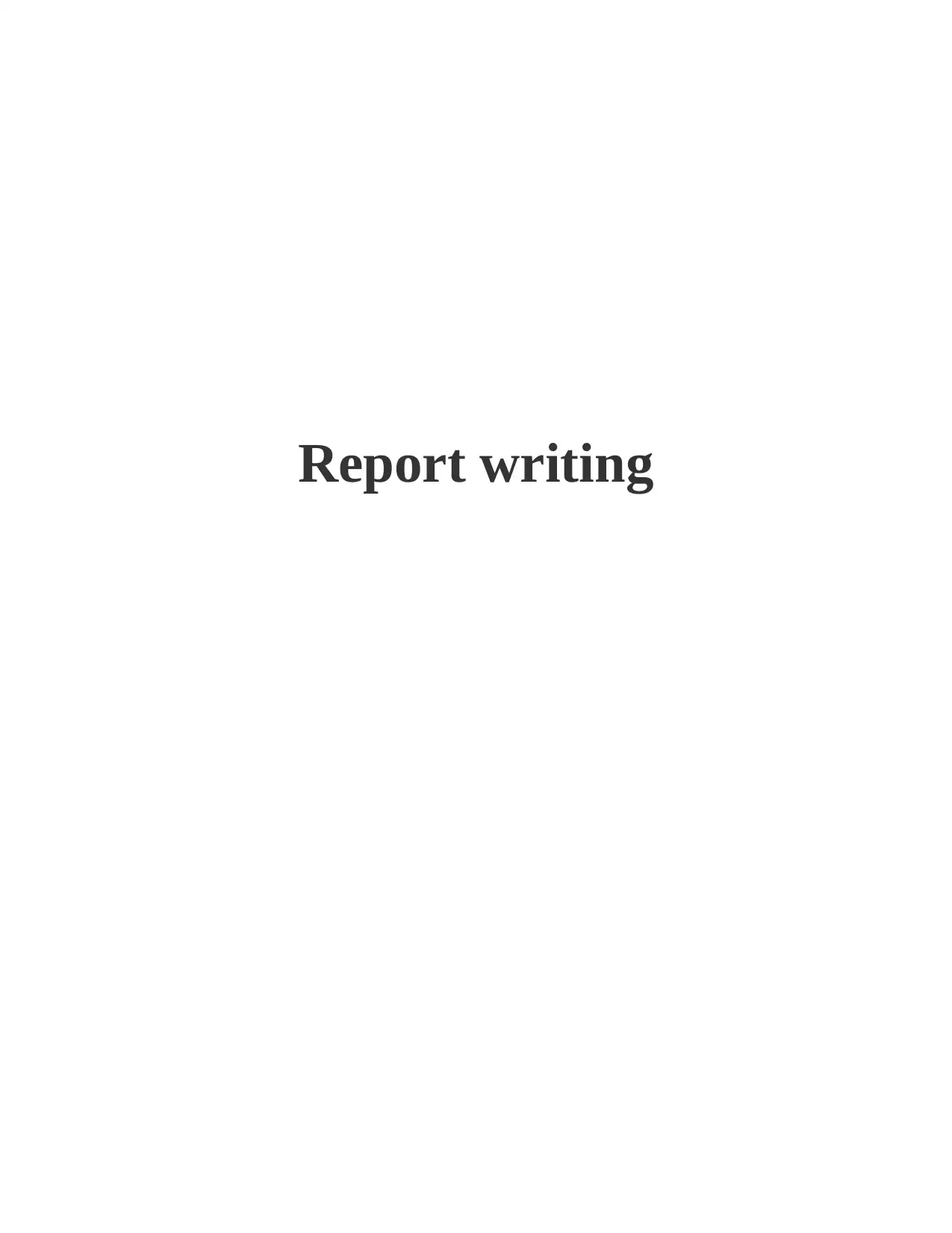
Report writing
Paraphrase This Document
Need a fresh take? Get an instant paraphrase of this document with our AI Paraphraser
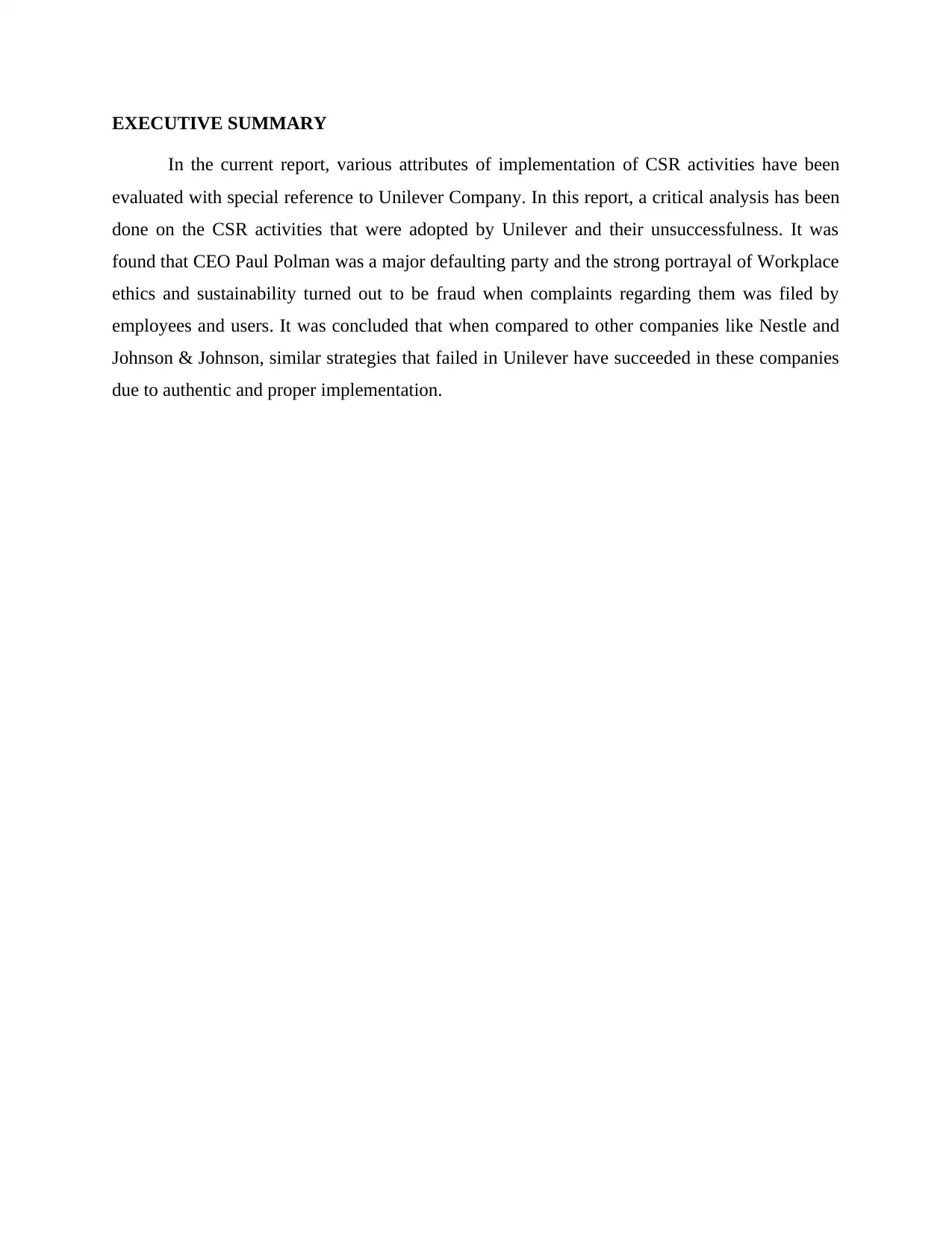
EXECUTIVE SUMMARY
In the current report, various attributes of implementation of CSR activities have been
evaluated with special reference to Unilever Company. In this report, a critical analysis has been
done on the CSR activities that were adopted by Unilever and their unsuccessfulness. It was
found that CEO Paul Polman was a major defaulting party and the strong portrayal of Workplace
ethics and sustainability turned out to be fraud when complaints regarding them was filed by
employees and users. It was concluded that when compared to other companies like Nestle and
Johnson & Johnson, similar strategies that failed in Unilever have succeeded in these companies
due to authentic and proper implementation.
In the current report, various attributes of implementation of CSR activities have been
evaluated with special reference to Unilever Company. In this report, a critical analysis has been
done on the CSR activities that were adopted by Unilever and their unsuccessfulness. It was
found that CEO Paul Polman was a major defaulting party and the strong portrayal of Workplace
ethics and sustainability turned out to be fraud when complaints regarding them was filed by
employees and users. It was concluded that when compared to other companies like Nestle and
Johnson & Johnson, similar strategies that failed in Unilever have succeeded in these companies
due to authentic and proper implementation.
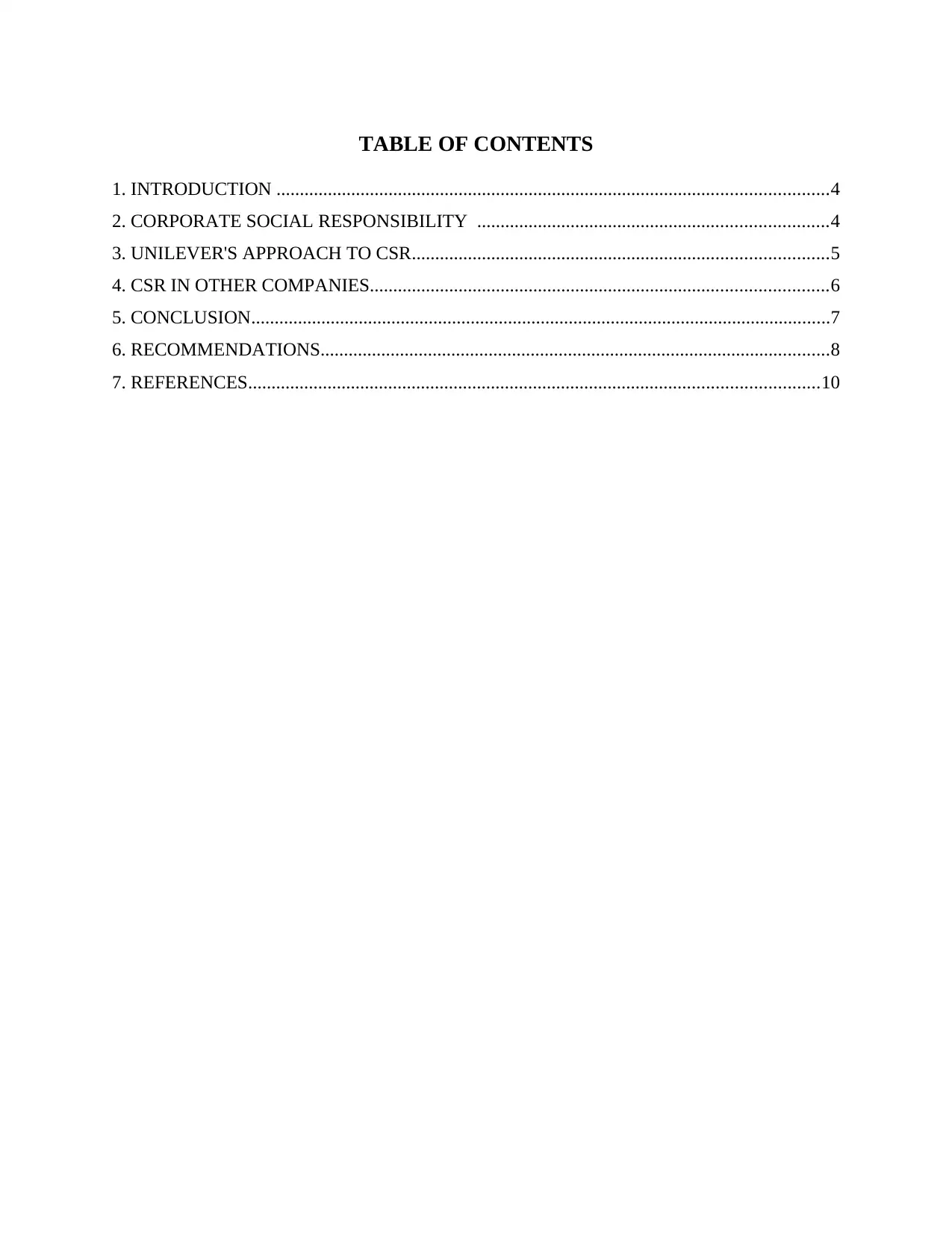
TABLE OF CONTENTS
1. INTRODUCTION ......................................................................................................................4
2. CORPORATE SOCIAL RESPONSIBILITY ...........................................................................4
3. UNILEVER'S APPROACH TO CSR.........................................................................................5
4. CSR IN OTHER COMPANIES..................................................................................................6
5. CONCLUSION............................................................................................................................7
6. RECOMMENDATIONS.............................................................................................................8
7. REFERENCES..........................................................................................................................10
1. INTRODUCTION ......................................................................................................................4
2. CORPORATE SOCIAL RESPONSIBILITY ...........................................................................4
3. UNILEVER'S APPROACH TO CSR.........................................................................................5
4. CSR IN OTHER COMPANIES..................................................................................................6
5. CONCLUSION............................................................................................................................7
6. RECOMMENDATIONS.............................................................................................................8
7. REFERENCES..........................................................................................................................10
⊘ This is a preview!⊘
Do you want full access?
Subscribe today to unlock all pages.

Trusted by 1+ million students worldwide
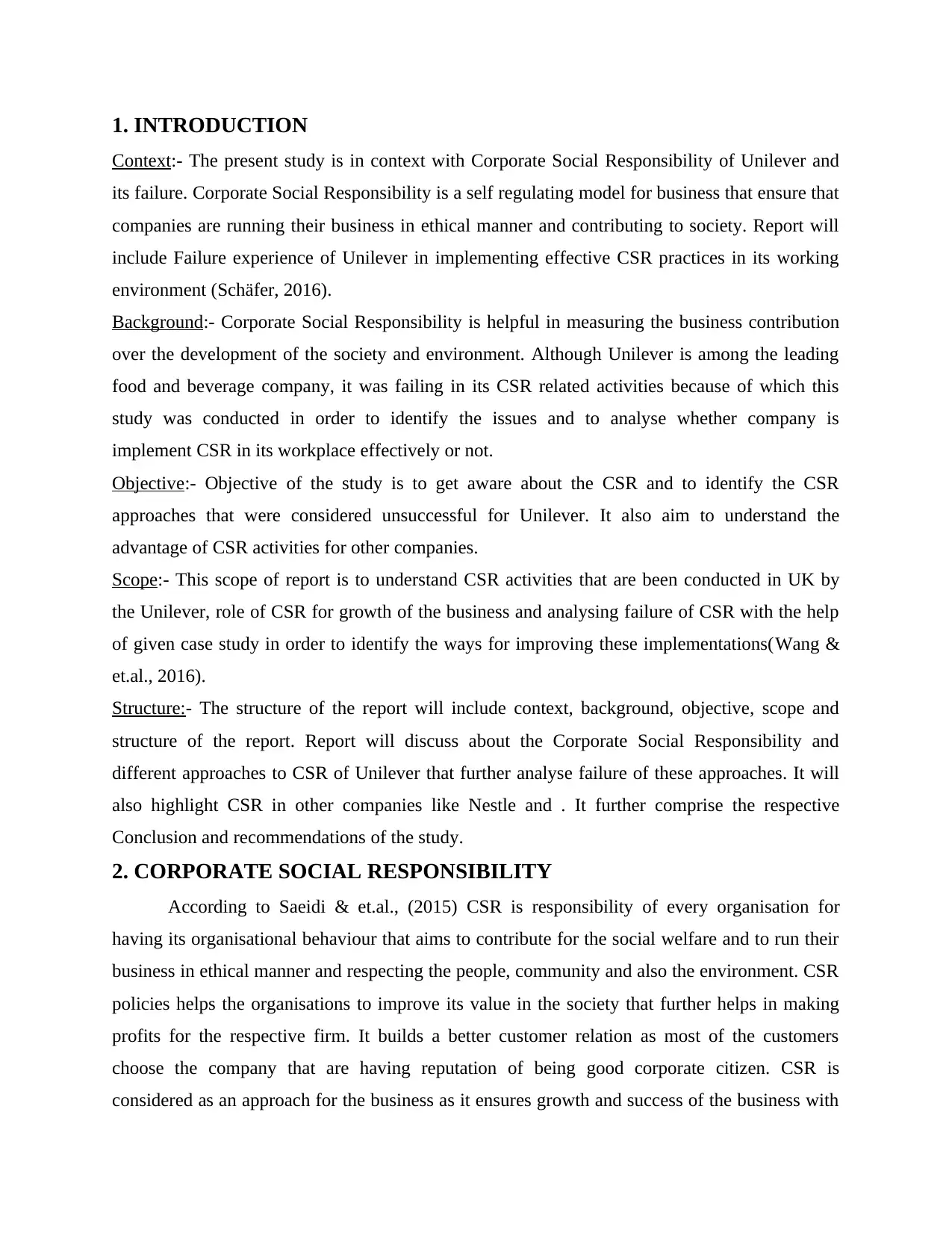
1. INTRODUCTION
Context:- The present study is in context with Corporate Social Responsibility of Unilever and
its failure. Corporate Social Responsibility is a self regulating model for business that ensure that
companies are running their business in ethical manner and contributing to society. Report will
include Failure experience of Unilever in implementing effective CSR practices in its working
environment (Schäfer, 2016).
Background:- Corporate Social Responsibility is helpful in measuring the business contribution
over the development of the society and environment. Although Unilever is among the leading
food and beverage company, it was failing in its CSR related activities because of which this
study was conducted in order to identify the issues and to analyse whether company is
implement CSR in its workplace effectively or not.
Objective:- Objective of the study is to get aware about the CSR and to identify the CSR
approaches that were considered unsuccessful for Unilever. It also aim to understand the
advantage of CSR activities for other companies.
Scope:- This scope of report is to understand CSR activities that are been conducted in UK by
the Unilever, role of CSR for growth of the business and analysing failure of CSR with the help
of given case study in order to identify the ways for improving these implementations(Wang &
et.al., 2016).
Structure:- The structure of the report will include context, background, objective, scope and
structure of the report. Report will discuss about the Corporate Social Responsibility and
different approaches to CSR of Unilever that further analyse failure of these approaches. It will
also highlight CSR in other companies like Nestle and . It further comprise the respective
Conclusion and recommendations of the study.
2. CORPORATE SOCIAL RESPONSIBILITY
According to Saeidi & et.al., (2015) CSR is responsibility of every organisation for
having its organisational behaviour that aims to contribute for the social welfare and to run their
business in ethical manner and respecting the people, community and also the environment. CSR
policies helps the organisations to improve its value in the society that further helps in making
profits for the respective firm. It builds a better customer relation as most of the customers
choose the company that are having reputation of being good corporate citizen. CSR is
considered as an approach for the business as it ensures growth and success of the business with
Context:- The present study is in context with Corporate Social Responsibility of Unilever and
its failure. Corporate Social Responsibility is a self regulating model for business that ensure that
companies are running their business in ethical manner and contributing to society. Report will
include Failure experience of Unilever in implementing effective CSR practices in its working
environment (Schäfer, 2016).
Background:- Corporate Social Responsibility is helpful in measuring the business contribution
over the development of the society and environment. Although Unilever is among the leading
food and beverage company, it was failing in its CSR related activities because of which this
study was conducted in order to identify the issues and to analyse whether company is
implement CSR in its workplace effectively or not.
Objective:- Objective of the study is to get aware about the CSR and to identify the CSR
approaches that were considered unsuccessful for Unilever. It also aim to understand the
advantage of CSR activities for other companies.
Scope:- This scope of report is to understand CSR activities that are been conducted in UK by
the Unilever, role of CSR for growth of the business and analysing failure of CSR with the help
of given case study in order to identify the ways for improving these implementations(Wang &
et.al., 2016).
Structure:- The structure of the report will include context, background, objective, scope and
structure of the report. Report will discuss about the Corporate Social Responsibility and
different approaches to CSR of Unilever that further analyse failure of these approaches. It will
also highlight CSR in other companies like Nestle and . It further comprise the respective
Conclusion and recommendations of the study.
2. CORPORATE SOCIAL RESPONSIBILITY
According to Saeidi & et.al., (2015) CSR is responsibility of every organisation for
having its organisational behaviour that aims to contribute for the social welfare and to run their
business in ethical manner and respecting the people, community and also the environment. CSR
policies helps the organisations to improve its value in the society that further helps in making
profits for the respective firm. It builds a better customer relation as most of the customers
choose the company that are having reputation of being good corporate citizen. CSR is
considered as an approach for the business as it ensures growth and success of the business with
Paraphrase This Document
Need a fresh take? Get an instant paraphrase of this document with our AI Paraphraser
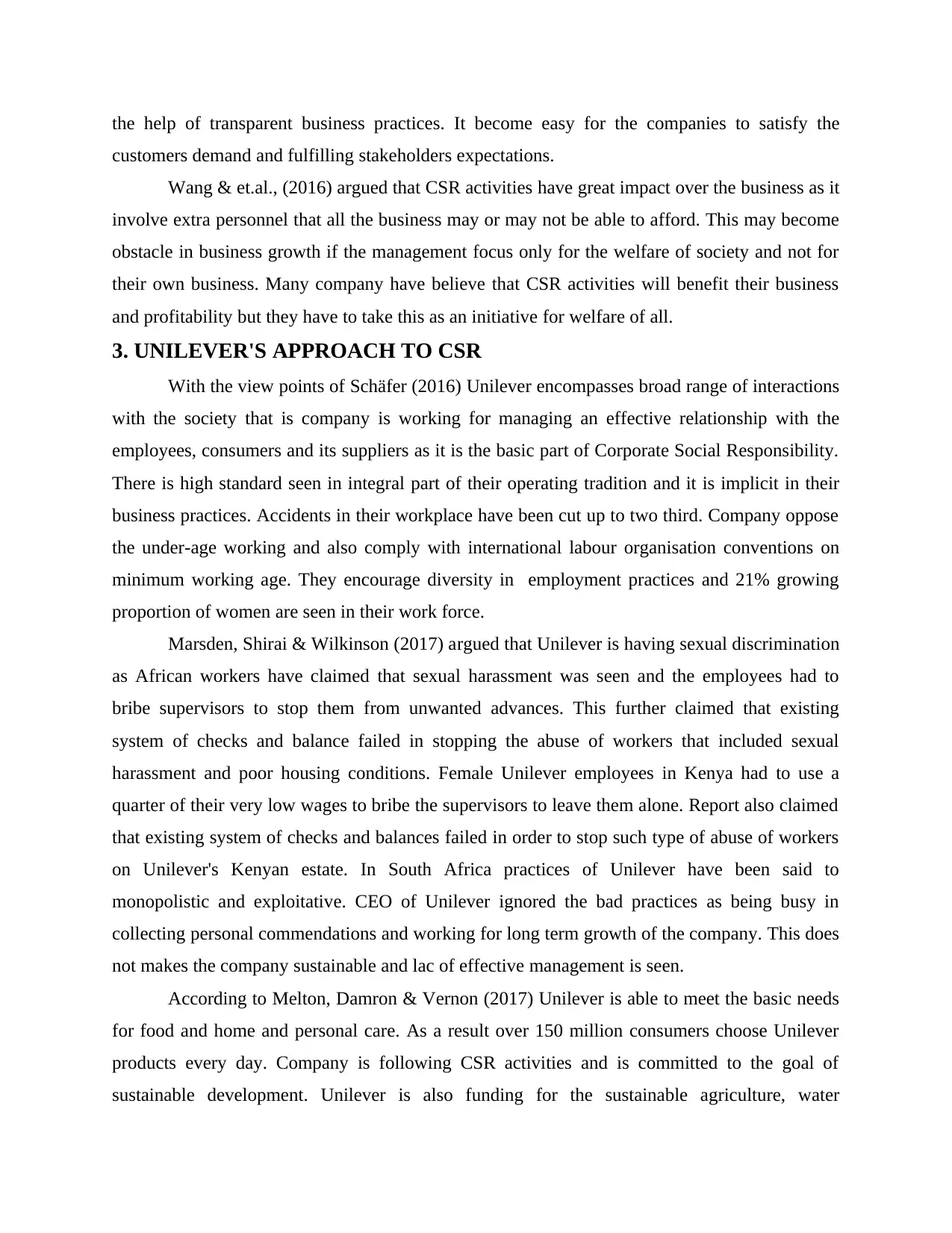
the help of transparent business practices. It become easy for the companies to satisfy the
customers demand and fulfilling stakeholders expectations.
Wang & et.al., (2016) argued that CSR activities have great impact over the business as it
involve extra personnel that all the business may or may not be able to afford. This may become
obstacle in business growth if the management focus only for the welfare of society and not for
their own business. Many company have believe that CSR activities will benefit their business
and profitability but they have to take this as an initiative for welfare of all.
3. UNILEVER'S APPROACH TO CSR
With the view points of Schäfer (2016) Unilever encompasses broad range of interactions
with the society that is company is working for managing an effective relationship with the
employees, consumers and its suppliers as it is the basic part of Corporate Social Responsibility.
There is high standard seen in integral part of their operating tradition and it is implicit in their
business practices. Accidents in their workplace have been cut up to two third. Company oppose
the under-age working and also comply with international labour organisation conventions on
minimum working age. They encourage diversity in employment practices and 21% growing
proportion of women are seen in their work force.
Marsden, Shirai & Wilkinson (2017) argued that Unilever is having sexual discrimination
as African workers have claimed that sexual harassment was seen and the employees had to
bribe supervisors to stop them from unwanted advances. This further claimed that existing
system of checks and balance failed in stopping the abuse of workers that included sexual
harassment and poor housing conditions. Female Unilever employees in Kenya had to use a
quarter of their very low wages to bribe the supervisors to leave them alone. Report also claimed
that existing system of checks and balances failed in order to stop such type of abuse of workers
on Unilever's Kenyan estate. In South Africa practices of Unilever have been said to
monopolistic and exploitative. CEO of Unilever ignored the bad practices as being busy in
collecting personal commendations and working for long term growth of the company. This does
not makes the company sustainable and lac of effective management is seen.
According to Melton, Damron & Vernon (2017) Unilever is able to meet the basic needs
for food and home and personal care. As a result over 150 million consumers choose Unilever
products every day. Company is following CSR activities and is committed to the goal of
sustainable development. Unilever is also funding for the sustainable agriculture, water
customers demand and fulfilling stakeholders expectations.
Wang & et.al., (2016) argued that CSR activities have great impact over the business as it
involve extra personnel that all the business may or may not be able to afford. This may become
obstacle in business growth if the management focus only for the welfare of society and not for
their own business. Many company have believe that CSR activities will benefit their business
and profitability but they have to take this as an initiative for welfare of all.
3. UNILEVER'S APPROACH TO CSR
With the view points of Schäfer (2016) Unilever encompasses broad range of interactions
with the society that is company is working for managing an effective relationship with the
employees, consumers and its suppliers as it is the basic part of Corporate Social Responsibility.
There is high standard seen in integral part of their operating tradition and it is implicit in their
business practices. Accidents in their workplace have been cut up to two third. Company oppose
the under-age working and also comply with international labour organisation conventions on
minimum working age. They encourage diversity in employment practices and 21% growing
proportion of women are seen in their work force.
Marsden, Shirai & Wilkinson (2017) argued that Unilever is having sexual discrimination
as African workers have claimed that sexual harassment was seen and the employees had to
bribe supervisors to stop them from unwanted advances. This further claimed that existing
system of checks and balance failed in stopping the abuse of workers that included sexual
harassment and poor housing conditions. Female Unilever employees in Kenya had to use a
quarter of their very low wages to bribe the supervisors to leave them alone. Report also claimed
that existing system of checks and balances failed in order to stop such type of abuse of workers
on Unilever's Kenyan estate. In South Africa practices of Unilever have been said to
monopolistic and exploitative. CEO of Unilever ignored the bad practices as being busy in
collecting personal commendations and working for long term growth of the company. This does
not makes the company sustainable and lac of effective management is seen.
According to Melton, Damron & Vernon (2017) Unilever is able to meet the basic needs
for food and home and personal care. As a result over 150 million consumers choose Unilever
products every day. Company is following CSR activities and is committed to the goal of
sustainable development. Unilever is also funding for the sustainable agriculture, water
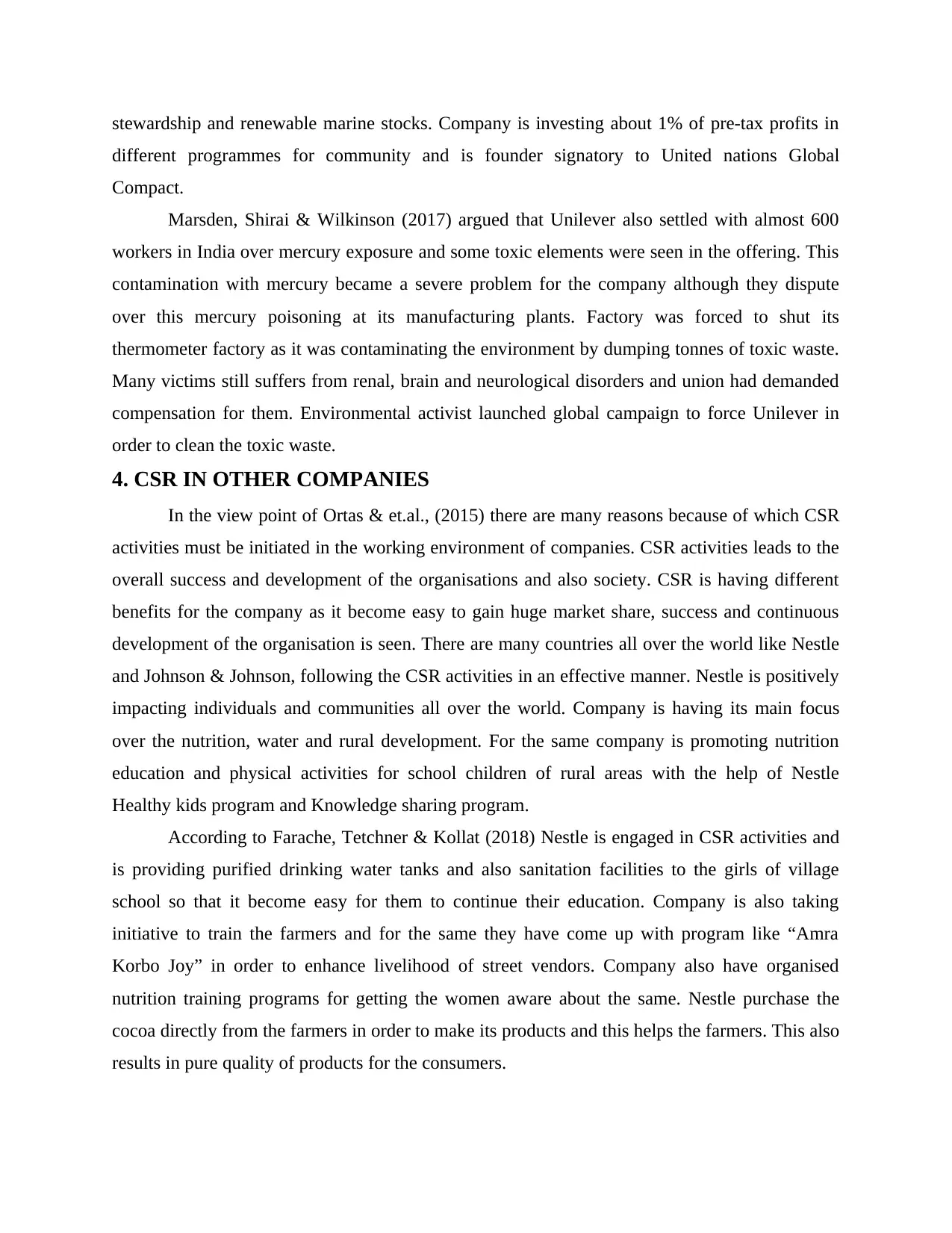
stewardship and renewable marine stocks. Company is investing about 1% of pre-tax profits in
different programmes for community and is founder signatory to United nations Global
Compact.
Marsden, Shirai & Wilkinson (2017) argued that Unilever also settled with almost 600
workers in India over mercury exposure and some toxic elements were seen in the offering. This
contamination with mercury became a severe problem for the company although they dispute
over this mercury poisoning at its manufacturing plants. Factory was forced to shut its
thermometer factory as it was contaminating the environment by dumping tonnes of toxic waste.
Many victims still suffers from renal, brain and neurological disorders and union had demanded
compensation for them. Environmental activist launched global campaign to force Unilever in
order to clean the toxic waste.
4. CSR IN OTHER COMPANIES
In the view point of Ortas & et.al., (2015) there are many reasons because of which CSR
activities must be initiated in the working environment of companies. CSR activities leads to the
overall success and development of the organisations and also society. CSR is having different
benefits for the company as it become easy to gain huge market share, success and continuous
development of the organisation is seen. There are many countries all over the world like Nestle
and Johnson & Johnson, following the CSR activities in an effective manner. Nestle is positively
impacting individuals and communities all over the world. Company is having its main focus
over the nutrition, water and rural development. For the same company is promoting nutrition
education and physical activities for school children of rural areas with the help of Nestle
Healthy kids program and Knowledge sharing program.
According to Farache, Tetchner & Kollat (2018) Nestle is engaged in CSR activities and
is providing purified drinking water tanks and also sanitation facilities to the girls of village
school so that it become easy for them to continue their education. Company is also taking
initiative to train the farmers and for the same they have come up with program like “Amra
Korbo Joy” in order to enhance livelihood of street vendors. Company also have organised
nutrition training programs for getting the women aware about the same. Nestle purchase the
cocoa directly from the farmers in order to make its products and this helps the farmers. This also
results in pure quality of products for the consumers.
different programmes for community and is founder signatory to United nations Global
Compact.
Marsden, Shirai & Wilkinson (2017) argued that Unilever also settled with almost 600
workers in India over mercury exposure and some toxic elements were seen in the offering. This
contamination with mercury became a severe problem for the company although they dispute
over this mercury poisoning at its manufacturing plants. Factory was forced to shut its
thermometer factory as it was contaminating the environment by dumping tonnes of toxic waste.
Many victims still suffers from renal, brain and neurological disorders and union had demanded
compensation for them. Environmental activist launched global campaign to force Unilever in
order to clean the toxic waste.
4. CSR IN OTHER COMPANIES
In the view point of Ortas & et.al., (2015) there are many reasons because of which CSR
activities must be initiated in the working environment of companies. CSR activities leads to the
overall success and development of the organisations and also society. CSR is having different
benefits for the company as it become easy to gain huge market share, success and continuous
development of the organisation is seen. There are many countries all over the world like Nestle
and Johnson & Johnson, following the CSR activities in an effective manner. Nestle is positively
impacting individuals and communities all over the world. Company is having its main focus
over the nutrition, water and rural development. For the same company is promoting nutrition
education and physical activities for school children of rural areas with the help of Nestle
Healthy kids program and Knowledge sharing program.
According to Farache, Tetchner & Kollat (2018) Nestle is engaged in CSR activities and
is providing purified drinking water tanks and also sanitation facilities to the girls of village
school so that it become easy for them to continue their education. Company is also taking
initiative to train the farmers and for the same they have come up with program like “Amra
Korbo Joy” in order to enhance livelihood of street vendors. Company also have organised
nutrition training programs for getting the women aware about the same. Nestle purchase the
cocoa directly from the farmers in order to make its products and this helps the farmers. This also
results in pure quality of products for the consumers.
⊘ This is a preview!⊘
Do you want full access?
Subscribe today to unlock all pages.

Trusted by 1+ million students worldwide
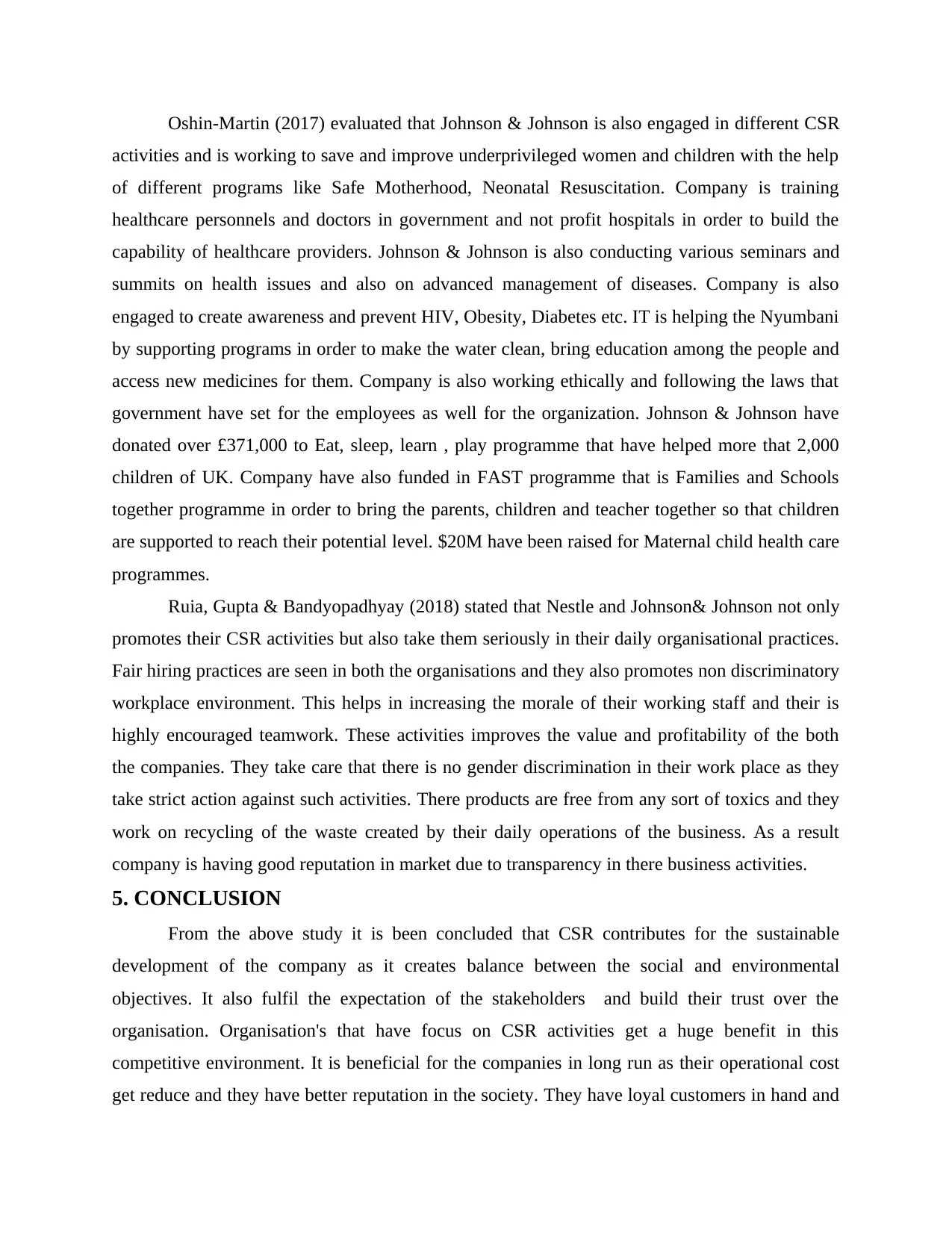
Oshin-Martin (2017) evaluated that Johnson & Johnson is also engaged in different CSR
activities and is working to save and improve underprivileged women and children with the help
of different programs like Safe Motherhood, Neonatal Resuscitation. Company is training
healthcare personnels and doctors in government and not profit hospitals in order to build the
capability of healthcare providers. Johnson & Johnson is also conducting various seminars and
summits on health issues and also on advanced management of diseases. Company is also
engaged to create awareness and prevent HIV, Obesity, Diabetes etc. IT is helping the Nyumbani
by supporting programs in order to make the water clean, bring education among the people and
access new medicines for them. Company is also working ethically and following the laws that
government have set for the employees as well for the organization. Johnson & Johnson have
donated over £371,000 to Eat, sleep, learn , play programme that have helped more that 2,000
children of UK. Company have also funded in FAST programme that is Families and Schools
together programme in order to bring the parents, children and teacher together so that children
are supported to reach their potential level. $20M have been raised for Maternal child health care
programmes.
Ruia, Gupta & Bandyopadhyay (2018) stated that Nestle and Johnson& Johnson not only
promotes their CSR activities but also take them seriously in their daily organisational practices.
Fair hiring practices are seen in both the organisations and they also promotes non discriminatory
workplace environment. This helps in increasing the morale of their working staff and their is
highly encouraged teamwork. These activities improves the value and profitability of the both
the companies. They take care that there is no gender discrimination in their work place as they
take strict action against such activities. There products are free from any sort of toxics and they
work on recycling of the waste created by their daily operations of the business. As a result
company is having good reputation in market due to transparency in there business activities.
5. CONCLUSION
From the above study it is been concluded that CSR contributes for the sustainable
development of the company as it creates balance between the social and environmental
objectives. It also fulfil the expectation of the stakeholders and build their trust over the
organisation. Organisation's that have focus on CSR activities get a huge benefit in this
competitive environment. It is beneficial for the companies in long run as their operational cost
get reduce and they have better reputation in the society. They have loyal customers in hand and
activities and is working to save and improve underprivileged women and children with the help
of different programs like Safe Motherhood, Neonatal Resuscitation. Company is training
healthcare personnels and doctors in government and not profit hospitals in order to build the
capability of healthcare providers. Johnson & Johnson is also conducting various seminars and
summits on health issues and also on advanced management of diseases. Company is also
engaged to create awareness and prevent HIV, Obesity, Diabetes etc. IT is helping the Nyumbani
by supporting programs in order to make the water clean, bring education among the people and
access new medicines for them. Company is also working ethically and following the laws that
government have set for the employees as well for the organization. Johnson & Johnson have
donated over £371,000 to Eat, sleep, learn , play programme that have helped more that 2,000
children of UK. Company have also funded in FAST programme that is Families and Schools
together programme in order to bring the parents, children and teacher together so that children
are supported to reach their potential level. $20M have been raised for Maternal child health care
programmes.
Ruia, Gupta & Bandyopadhyay (2018) stated that Nestle and Johnson& Johnson not only
promotes their CSR activities but also take them seriously in their daily organisational practices.
Fair hiring practices are seen in both the organisations and they also promotes non discriminatory
workplace environment. This helps in increasing the morale of their working staff and their is
highly encouraged teamwork. These activities improves the value and profitability of the both
the companies. They take care that there is no gender discrimination in their work place as they
take strict action against such activities. There products are free from any sort of toxics and they
work on recycling of the waste created by their daily operations of the business. As a result
company is having good reputation in market due to transparency in there business activities.
5. CONCLUSION
From the above study it is been concluded that CSR contributes for the sustainable
development of the company as it creates balance between the social and environmental
objectives. It also fulfil the expectation of the stakeholders and build their trust over the
organisation. Organisation's that have focus on CSR activities get a huge benefit in this
competitive environment. It is beneficial for the companies in long run as their operational cost
get reduce and they have better reputation in the society. They have loyal customers in hand and
Paraphrase This Document
Need a fresh take? Get an instant paraphrase of this document with our AI Paraphraser
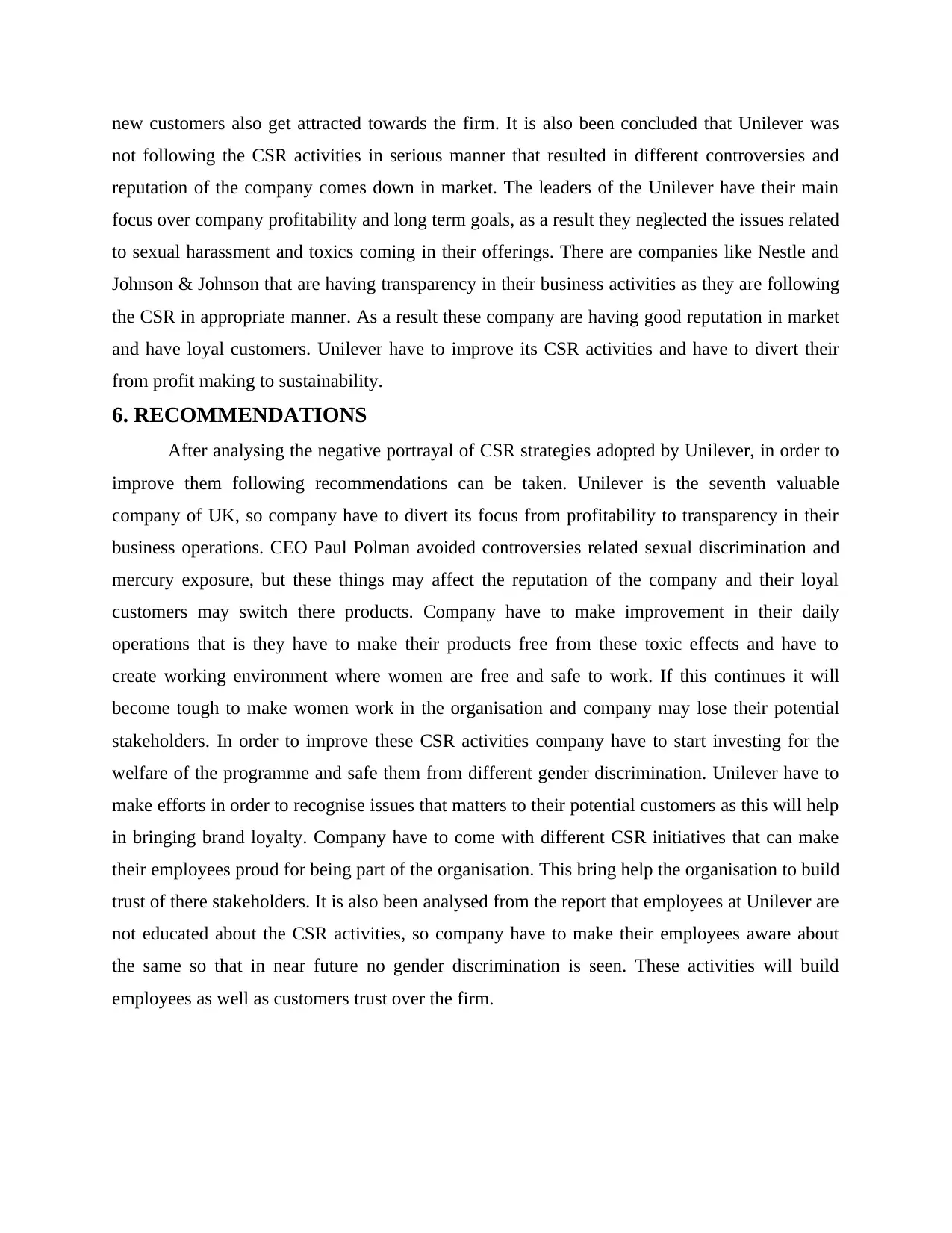
new customers also get attracted towards the firm. It is also been concluded that Unilever was
not following the CSR activities in serious manner that resulted in different controversies and
reputation of the company comes down in market. The leaders of the Unilever have their main
focus over company profitability and long term goals, as a result they neglected the issues related
to sexual harassment and toxics coming in their offerings. There are companies like Nestle and
Johnson & Johnson that are having transparency in their business activities as they are following
the CSR in appropriate manner. As a result these company are having good reputation in market
and have loyal customers. Unilever have to improve its CSR activities and have to divert their
from profit making to sustainability.
6. RECOMMENDATIONS
After analysing the negative portrayal of CSR strategies adopted by Unilever, in order to
improve them following recommendations can be taken. Unilever is the seventh valuable
company of UK, so company have to divert its focus from profitability to transparency in their
business operations. CEO Paul Polman avoided controversies related sexual discrimination and
mercury exposure, but these things may affect the reputation of the company and their loyal
customers may switch there products. Company have to make improvement in their daily
operations that is they have to make their products free from these toxic effects and have to
create working environment where women are free and safe to work. If this continues it will
become tough to make women work in the organisation and company may lose their potential
stakeholders. In order to improve these CSR activities company have to start investing for the
welfare of the programme and safe them from different gender discrimination. Unilever have to
make efforts in order to recognise issues that matters to their potential customers as this will help
in bringing brand loyalty. Company have to come with different CSR initiatives that can make
their employees proud for being part of the organisation. This bring help the organisation to build
trust of there stakeholders. It is also been analysed from the report that employees at Unilever are
not educated about the CSR activities, so company have to make their employees aware about
the same so that in near future no gender discrimination is seen. These activities will build
employees as well as customers trust over the firm.
not following the CSR activities in serious manner that resulted in different controversies and
reputation of the company comes down in market. The leaders of the Unilever have their main
focus over company profitability and long term goals, as a result they neglected the issues related
to sexual harassment and toxics coming in their offerings. There are companies like Nestle and
Johnson & Johnson that are having transparency in their business activities as they are following
the CSR in appropriate manner. As a result these company are having good reputation in market
and have loyal customers. Unilever have to improve its CSR activities and have to divert their
from profit making to sustainability.
6. RECOMMENDATIONS
After analysing the negative portrayal of CSR strategies adopted by Unilever, in order to
improve them following recommendations can be taken. Unilever is the seventh valuable
company of UK, so company have to divert its focus from profitability to transparency in their
business operations. CEO Paul Polman avoided controversies related sexual discrimination and
mercury exposure, but these things may affect the reputation of the company and their loyal
customers may switch there products. Company have to make improvement in their daily
operations that is they have to make their products free from these toxic effects and have to
create working environment where women are free and safe to work. If this continues it will
become tough to make women work in the organisation and company may lose their potential
stakeholders. In order to improve these CSR activities company have to start investing for the
welfare of the programme and safe them from different gender discrimination. Unilever have to
make efforts in order to recognise issues that matters to their potential customers as this will help
in bringing brand loyalty. Company have to come with different CSR initiatives that can make
their employees proud for being part of the organisation. This bring help the organisation to build
trust of there stakeholders. It is also been analysed from the report that employees at Unilever are
not educated about the CSR activities, so company have to make their employees aware about
the same so that in near future no gender discrimination is seen. These activities will build
employees as well as customers trust over the firm.

⊘ This is a preview!⊘
Do you want full access?
Subscribe today to unlock all pages.

Trusted by 1+ million students worldwide
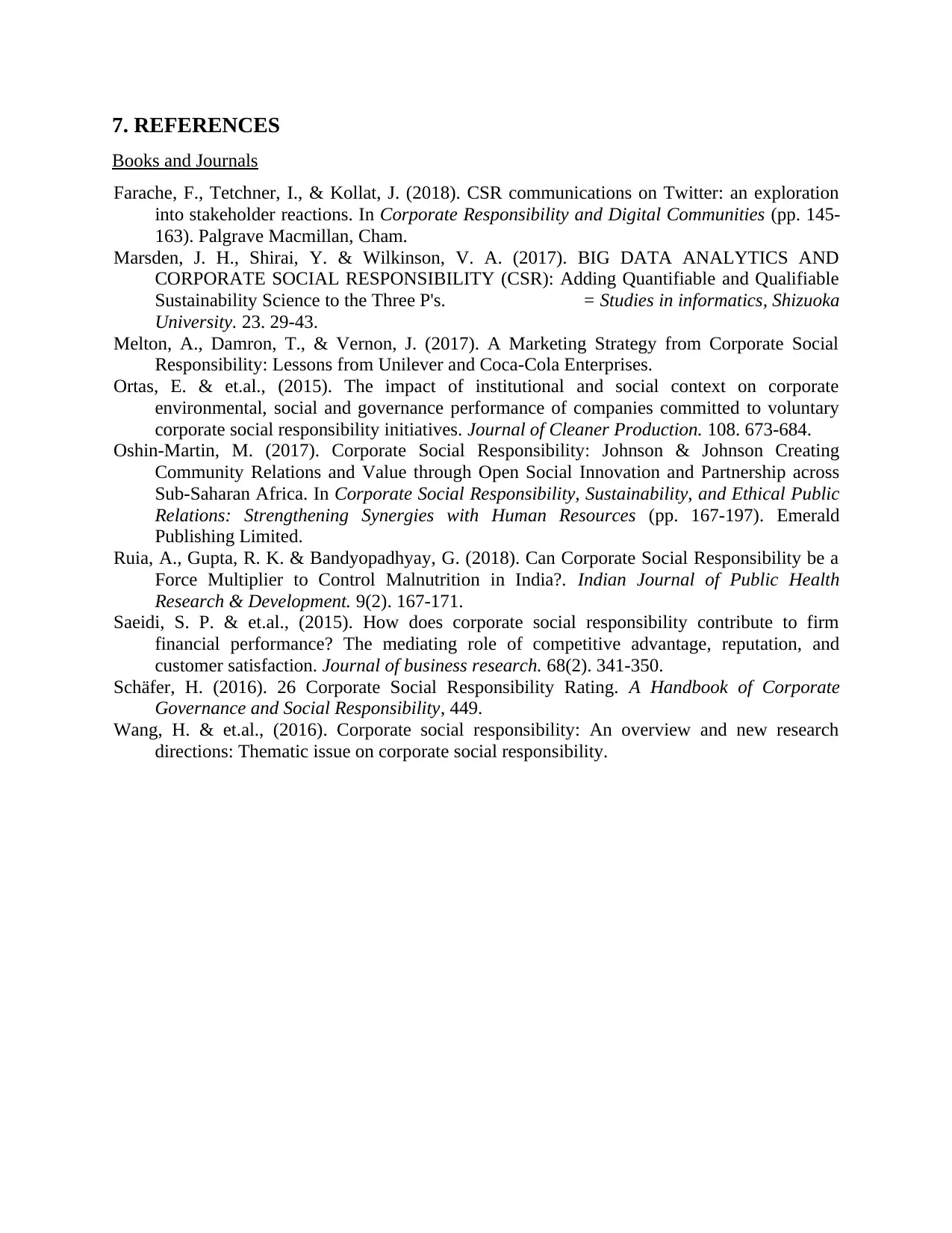
7. REFERENCES
Books and Journals
Farache, F., Tetchner, I., & Kollat, J. (2018). CSR communications on Twitter: an exploration
into stakeholder reactions. In Corporate Responsibility and Digital Communities (pp. 145-
163). Palgrave Macmillan, Cham.
Marsden, J. H., Shirai, Y. & Wilkinson, V. A. (2017). BIG DATA ANALYTICS AND
CORPORATE SOCIAL RESPONSIBILITY (CSR): Adding Quantifiable and Qualifiable
Sustainability Science to the Three P's. 静静静静静静静静静= Studies in informatics, Shizuoka
University. 23. 29-43.
Melton, A., Damron, T., & Vernon, J. (2017). A Marketing Strategy from Corporate Social
Responsibility: Lessons from Unilever and Coca-Cola Enterprises.
Ortas, E. & et.al., (2015). The impact of institutional and social context on corporate
environmental, social and governance performance of companies committed to voluntary
corporate social responsibility initiatives. Journal of Cleaner Production. 108. 673-684.
Oshin-Martin, M. (2017). Corporate Social Responsibility: Johnson & Johnson Creating
Community Relations and Value through Open Social Innovation and Partnership across
Sub-Saharan Africa. In Corporate Social Responsibility, Sustainability, and Ethical Public
Relations: Strengthening Synergies with Human Resources (pp. 167-197). Emerald
Publishing Limited.
Ruia, A., Gupta, R. K. & Bandyopadhyay, G. (2018). Can Corporate Social Responsibility be a
Force Multiplier to Control Malnutrition in India?. Indian Journal of Public Health
Research & Development. 9(2). 167-171.
Saeidi, S. P. & et.al., (2015). How does corporate social responsibility contribute to firm
financial performance? The mediating role of competitive advantage, reputation, and
customer satisfaction. Journal of business research. 68(2). 341-350.
Schäfer, H. (2016). 26 Corporate Social Responsibility Rating. A Handbook of Corporate
Governance and Social Responsibility, 449.
Wang, H. & et.al., (2016). Corporate social responsibility: An overview and new research
directions: Thematic issue on corporate social responsibility.
Books and Journals
Farache, F., Tetchner, I., & Kollat, J. (2018). CSR communications on Twitter: an exploration
into stakeholder reactions. In Corporate Responsibility and Digital Communities (pp. 145-
163). Palgrave Macmillan, Cham.
Marsden, J. H., Shirai, Y. & Wilkinson, V. A. (2017). BIG DATA ANALYTICS AND
CORPORATE SOCIAL RESPONSIBILITY (CSR): Adding Quantifiable and Qualifiable
Sustainability Science to the Three P's. 静静静静静静静静静= Studies in informatics, Shizuoka
University. 23. 29-43.
Melton, A., Damron, T., & Vernon, J. (2017). A Marketing Strategy from Corporate Social
Responsibility: Lessons from Unilever and Coca-Cola Enterprises.
Ortas, E. & et.al., (2015). The impact of institutional and social context on corporate
environmental, social and governance performance of companies committed to voluntary
corporate social responsibility initiatives. Journal of Cleaner Production. 108. 673-684.
Oshin-Martin, M. (2017). Corporate Social Responsibility: Johnson & Johnson Creating
Community Relations and Value through Open Social Innovation and Partnership across
Sub-Saharan Africa. In Corporate Social Responsibility, Sustainability, and Ethical Public
Relations: Strengthening Synergies with Human Resources (pp. 167-197). Emerald
Publishing Limited.
Ruia, A., Gupta, R. K. & Bandyopadhyay, G. (2018). Can Corporate Social Responsibility be a
Force Multiplier to Control Malnutrition in India?. Indian Journal of Public Health
Research & Development. 9(2). 167-171.
Saeidi, S. P. & et.al., (2015). How does corporate social responsibility contribute to firm
financial performance? The mediating role of competitive advantage, reputation, and
customer satisfaction. Journal of business research. 68(2). 341-350.
Schäfer, H. (2016). 26 Corporate Social Responsibility Rating. A Handbook of Corporate
Governance and Social Responsibility, 449.
Wang, H. & et.al., (2016). Corporate social responsibility: An overview and new research
directions: Thematic issue on corporate social responsibility.
1 out of 10
Related Documents
Your All-in-One AI-Powered Toolkit for Academic Success.
+13062052269
info@desklib.com
Available 24*7 on WhatsApp / Email
![[object Object]](/_next/static/media/star-bottom.7253800d.svg)
Unlock your academic potential
Copyright © 2020–2026 A2Z Services. All Rights Reserved. Developed and managed by ZUCOL.





